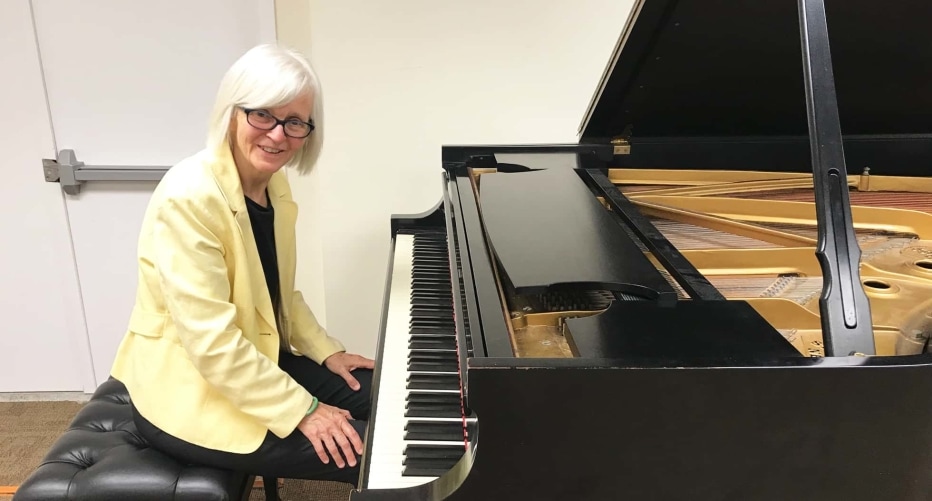In the Spotlight

Dominique Haughton
“ You want to be a musician? Be a musician. It’s absolutely life-transforming. You know, you will never be the same person again. If I can do it, you can do it too. ” Dominique Haughton, adult student
This matter of playing the piano is a very old dream.
30 some years ago I was a performance major, piano performance. I never felt I was good enough to do that.
Dominique then put aside her piano studies at UMass Lowell for more than 30 years to pursue her career as a professor, building programs at Bentley. Eventually she felt that her work had settled enough that she could return to her love of music.
I had been at Powers before over the years.
When I came back most recently, the idea was, I have to get ready to get back into UMass Lowell. The Bachelor of Music is a professional degree in music, and there aren’t that many places that deliver it. It’s a degree that people go into when they’re going to become professional musicians.
I’m not like a 13-year-old that’s trying to learn repertoire. It’s really different. It’s a matter of getting an old dream back on track.
And that dream is to become a decent, acceptable pianist. Now what does that mean, becoming an acceptable pianist? I still don’t know.
She came to Powers to find a teacher who could help her prepare for her audition, and ultimately, to begin a life-changing journey.
Of course I came back straight here and got in touch with the director, told her the story, and she figured out that I should work with Kathryn (Rosenbach) on something like that, and we’re still working together, Kathryn and I.
We looked at the requirements, and I had to play two pieces in two contrasting styles, so we had that sort of plan. And I passed the audition, so that was a good thing.
Part of the journey was, #1, figuring out what I really came back for, and then #2, how to make it work.
At first, I did not understand that what I came back for was really mostly the piano. I thought, okay, I’m coming back to finish my Bachelor of Music. Yes, I played the piano, but I did it sort of discreetly, you know, under the radar screen. I actually went into sound recording technology and piano, not a performance major. So I said to myself, okay, I don’t need to do anything in public.
And so, I mean, I did audition, I worked with Kathryn and everything. Neither she nor I knew at the time, that the real reason I came back to Lowell was really to become a decent pianist.
You really kind of have to see it in people, and then do the huge construction work that’s got to be done to turn a 60-something-year-old scientist, who is, you know, a very established professor in one place, into a pianist. I mean, how do you do things like that? It’s not trivial. I credit UMass Lowell Professor Jacob Hiser for taking on this task. He’s been participating and supporting whatever we do at Powers. And Powers has been very supportive too. So it really is a two-way street.
Even a professor has insecurities.
I’m a full professor in the department of mathematical sciences and global studies. I have something like 70 publications and a few books. So I’m a senior prof, I have PHD students. I’m not a big star, but I’m, you know, very established.
I mean, if you’re a professor in one place, for one thing you hold authority. You ask me to talk about statistics and I can do anything you want in front of 1,000 people, no problem. But playing the piano in public, now I’m out of my field. And I change identity between Bentley and Lowell. About 2/3 of the way up Route 3, I become a student. I’m not a professor anymore.
There are times when you’re going to wonder what the heck you are doing there. There are times you’re going to feel everybody’s better. Every single piano major is better than I am, right? You’re going to feel that.
But, on the other hand, it’s a great privilege. I mean, you can sit with people that are 19, 20, 21, right? That are going to be able to communicate with you as your peer. I mean, you’re going to be able to become a musician.
She offers some final advice for aspiring musicians…
There’s some serious talk I’m going to go to a conservatory in Paris once I’m done. I graduate next May (2020). So I’ll be continuing in piano. If I become a decent pianist, we’ve made possible something that I never thought was possible before.
You want to be a musician? Be a musician. It’s not necessarily easy every day. But it’s absolutely life-transforming. You know, you will never be the same person again.
If I can do it, you can do it too.

